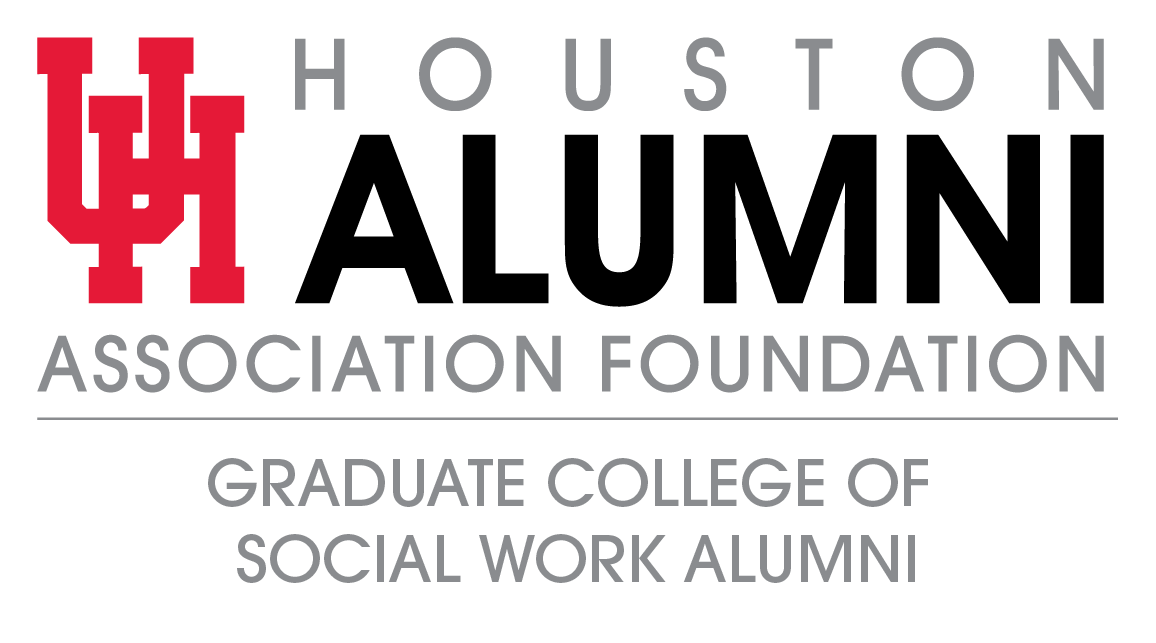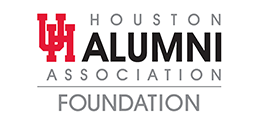
Graduate College of Social Work Alumni Association!
Mission: To enhance Alumni loyalty and pride by developing life-long relationships with one another at the Graduate College of Social Work.
For information about the College, please CLICK HERE.
Board Members

- President: Juliet London
- Vice President: Doris McCoy
- Treasurer: Steve Cochran (’03, MSW ’06)
- Secretary: Deshara Goss
- GCSW Staff Liaison: Ann Liberman (Director of Alumni, Career & Professional Development)
- Board member: Angela Goins (MSW ’96)
- Board member: Christian Capo
- Board Member: Ashley Cummings
- Board Member: Joy Malbrough
- Board Member: Carley Exiga
- Board Member: Nancy Gill
- Board Member: George Henry
- Board Member: DeJuana Jernigan
- Board Member: Shitonda Johnson
- Board Member: Frances "Biba" Lee
- Board Member: Lindsey Pollock
- Board Member: Harriet Smith
- Board Member: Ursela Knox
- Board Member: Jheri Walters
- Board Member: Laura Zelaya
- Board Member: Michael Daley
Signature Events
UH GCSW Alumni Association Scholarship
The Graduate College of Social Work Alumni Association Scholarship committee is now accepting applications for its scholarships. Two scholarships (A Charlotte Campbell & A General UHGCSWAA) in the amount of $3,000 each, will be awarded for the Spring 2022 Semester. The recipients will be acknowledged at the UH GCSW Alumni Association Annual Meeting in August.
Details for the scholarship are as follows:
Applicants can be part-time or full-time students, currently enrolled in the GCSW at the time of scholarship disbursement, must have a GPA of at least 3.25, and have a minimum of 12 SCH.
Advanced Standing Applicants with fewer than 12 SCH can apply with a waiver by providing Advanced Standing Verification, showing proof of credited number of hours received upon being determined advanced standing status.
Additionally, each applicant should include an unofficial transcript that verifies your GPA and a CV Resume.
To apply, please complete and return this application by September 4, 2021.
DOWNLOAD APPLICATION HERE
Scholarship Application (PDF): https://bit.ly/3l9Vv7f
Questions?
Please contact UH GCSW Alumni Board at uhgcswaab@gmail.com
UH GCSW Distinguished Alumni Nomination Application
The Graduate School for Social Work is now accepting nominations for its 2021 Distinguished Alumni.
You may download your nomination here: https://bit.ly/3fc4kcP
The chosen alumni member will also be applied to University of Houston Alumni Association Distinguished Alumni Nominations in September 2021.
If you have any questions, please feel free to contact UH GCSW Alumni Association Board Awards and Scholarship Committee at email to uhgcswaab@gmail.com.
Deadline Application Date: September 4, 2021
UH GCSW ALUMNI ASSOCIATION ANNUAL MEETING
GCSW Alumni Homecoming Tailgate
GCSW Continuing Education
Racial Justice and Liberatory Practice Series
Registration: https://uh.edu/gcsw-events/
Series Description:
This series will explore the historical and modern-day context of racism, white supremacy, and oppression from a systemic and interpersonal perspective. Participants will learn generalist frameworks and skills that contribute to a racial justice and liberatory practice. There will be an emphasis on an analysis of power and critical reflection on who benefits and who is harmed. All coursework is meant to allow participants to enhance their capacities to take action that challenges oppressive systems such as racism, sexism, classism, ageism, ableism, heterosexism, in the context of social work. Participants will have the opportunity to examine their experiences of privilege and oppression. This course will utilize book chapters, articles, videos, podcasts, websites, discussions, and more as ways of learning, with a focus on theory and action.
Each of the 4 courses in the series offered throughout the year can be taken separately and independently of the other courses. Each course will be 9 hours of self-paced content with 3 hours of instructor-led zoom discussion on specified dates.
Hybrid Course Instructional Format: Each of the 4 courses is 3 weeks in duration with 9 hours of Self-Paced Course Instruction and (3) 1-hour Zoom Instructor-Led Required Discussion Classes)
CEUs: 12 CEUs will be awarded upon course completion
Registration Cost: Each individual course is $240; Register at a reduced cost of $900 for the entire 4-course series
Class Size: Each course is limited to 25 participants
Overall Series Learning Outcomes:
Participants will:
1. Identify how the historical and modern-day context of racism, white supremacy, and oppression shape social institutions and are manifested in everyday life, from the perspective of both dominant and targeted groups.
2. Examine and reflect on the impact of racism and oppression in their personal and professional lives.
3. Analyze the relationship between power, privilege, and oppression, and the intersection between racism and other forms of systemic oppression.
4. Articulate how the field of social work has contributed to or been complicit in racism and oppression.
5. Explore how people who have been marginalized and oppressed have organized for their own liberation and connect these social movements to present day.
6. Define anti-racist and liberatory practice and provide concrete examples of what these looks like in social work.
7. Apply anti-racist, anti-oppressive, liberatory frameworks in their work as change agents for racial, social, and economic justice.
8. Identify plans for their own implementation of anti-racist and liberatory practices in their future work.
Course 1 (no prerequisite course is required)
Social Identity, Positionality, & Defining Racism
In this course, we look at racism as a system and our positions within that system, with an emphasis on social, economic and political power. We explore racial identity development and characteristics of dialogue about race and racism. We utilize book chapters, articles, videos, podcasts, websites, discussions and more as ways of learning, with a focus on theory and action.
Course Dates:
August 29 through September 16, 2022
Self-Paced with 1 hour required instructor-led discussions on: September 1, 8, 15, 2022, 11 am – Noon (CST)
Objectives:
- Identify their social identity and positionality and the implications on their practice
- Explore concepts, theories, and definitions about what race and racism are
- Better understand how racism operates systemically and the implications of this in the personal/professional settings they occupy
Course 2 (no prerequisite course is required)
White Supremacy, White Privilege, Racism & Oppression in Social Work
In this course, we look at the systems of whiteness, white supremacy, and white privilege/advantage, with an emphasis on why and how they were created and are maintained. We examine how white supremacy and racism show up within social work and are perpetuated by social work, both historically and present-day. We challenge the concept of cultural competence and look at ways to work for social change, not social control. We utilize book chapters, articles, videos, podcasts, websites, discussions and more as ways of learning, with a focus on theory and action.
Course Dates:
September 19 through October 7, 2022
Self-Paced with 1 hour required instructor-led discussions on: September 9, 29, and October 6, 2022, 11 am – Noon (CST)
Objectives:
- Explore concepts, theories and definitions of whiteness, white supremacy and white privilege/advantage
- Identify the reasons why whiteness, white supremacy and white privilege/advantage were created, how they were embedded in laws, policies and dominant cultural views, and how they are maintained
- Examine racism and white supremacy within social work, both historically and present-day, including whitewashed history, family separation, internment, surveillance, social control and discriminatory practices
Course 3 (no prerequisite course is required)
Using Critical Race Theory & Intersectionality in Practice
In this course, we look at critical race theory and how to use it in practice. We break down the concepts of color-blind racism and the myth of meritocracy and look at how they show up in social work and related disciplines. We explore intersectionality as a framework to understand how oppression operates and how we can use this framework in our practice. We utilize book chapters, articles, videos, podcasts, websites, discussions and more as ways of learning, with a focus on theory and action
Course Dates:
January 9 through January 27, 2023
Self-Paced with 1 hour required instructor-led discussions on: January 12, 19, 26, 2023, 11 am – Noon (CST)
Objectives:
- Explore critical race theory (CRT) as a framework for their practice
- Examine the myths of racial colorblindness and meritocracy and how they affect their practice
- Examine intersectionality as a framework to understand how forms of oppression operate in society and interact significantly with racism
- Understand that intersectionality comes from a Black Feminist perspective, has a specific analysis, and is not simply “diversity”
Course 4 (no prerequisite course is required)
Racial Justice & Anti-Oppressive Practice
In this course, we explore how to engage in racial justice and anti-oppressive practices. We look at how to do this work at the individual level, within organizations, and at the policy level. We review dangerous myths of why the racial wealth gap exists and ways to address it. We look at the impact of current social movements, such as Black Lives Matter. We examine how challenging antisemitism and Islamophobia are essential to this work. We utilize book chapters, articles, videos, podcasts, websites, discussions and more as ways of learning, with a focus on theory and action.
Course Dates:
January 30 through February 17, 2023
Self-Paced with 1 hour required instructor-led discussions on: February 2, 9, 16, 2023, 11 am – Noon (CST)
Objectives:
- Define racial justice and anti-oppressive practice (AOP)
- Explore strategies for implementing racial justice and AOP into their practice
- Begin to develop a plan of action for application of racial justice and AOP into their work


